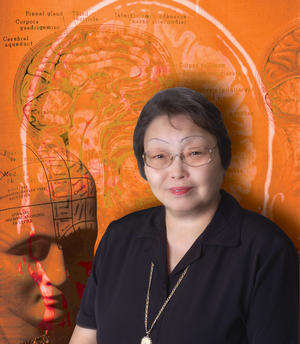Svetlana Dambinova facts for kids
Quick facts for kids
Svetlana Dambinova
|
|
|---|---|
 |
|
| Born |
Svetlana Dambinova
March 15, 1949 Irkutsk, Russian Federation
|
| Nationality | Buryat-Mongols |
| Alma mater |
|
| Scientific career | |
| Fields |
|
| Institutions |
|
Svetlana Dambinova is a famous Russian scientist who studies the brain. She was born on March 15, 1949, in Irkutsk, Russia. She is known around the world for her work on special parts of the brain called glutamate receptors. These receptors are like tiny antennas that help brain cells talk to each other.
Dr. Dambinova is a Distinguished Professor at the Laboratory of Biomarkers at Medical Center "DeKalb" in Atlanta, USA. She has also received special awards for her scientific work. These include being named an Honored Worker of Science in the Republic of Buryatia in 1996 and in the Russian Federation in 1998.
Early Life and Education
Svetlana Dambinova grew up in the Irkutsk Region of Russia. She went to school in Ulan-Ude, a city in the Republic of Buryatia. In 1966, she finished school with excellent grades.
She then went to Irkutsk State University. There, she earned her first degree in biochemistry in 1971. Biochemistry is the study of the chemical processes that happen inside living things. After that, she spent two years training at the Siberian Institute of Plant Physiology and Biochemistry.
Dr. Dambinova continued her studies at the Research Institute of Experimental Medicine. In 1976, she earned her PhD. Her research for her PhD was about how nerves affect muscles.
In 1980, Dr. Dambinova started her own laboratory. It was called the Laboratory of Functional Neurochemistry at the Research Institute of Experimental Medicine. Later, in 1990, she started another lab. This one was the Laboratory of Molecular Neurobiology at the Institute of Human Brain, Russia. In these labs, she studied how glutamate receptors work at a tiny, molecular level. By 1988, she had earned her Doctor of Science degree, which is a very high scientific degree.
Brain Research
Between 1989 and 1990, Dr. Dambinova was invited to work in the United States. She joined a project at the NINDS, NIH. This project focused on the genes related to glutamate receptors.
Her research helped us understand how glutamate receptors are involved in many brain conditions. These include epilepsy (a condition causing seizures), stroke (when blood flow to the brain is blocked), and traumatic brain injury (damage to the brain from an accident). She wrote a book called "Neuroreceptors of Glutamate." This book explains how certain glutamate receptors, like NMDA and AMPA receptors, can cause brain damage in these conditions.
From 1980 to 2000, Dr. Dambinova also studied how electrical stimulation of the brain could help people with certain brain problems. She looked at conditions like Parkinson's disease and chronic pain. She also helped develop new ways to find early signs of long-lasting pain.
Between 1995 and 2000, Dr. Dambinova was a visiting professor in many countries. She worked in Italy, Germany, Poland, the United States, Sweden, and Ireland. In Italy, she helped set up a lab in Sicily. There, she studied how glutamate receptors affect children with epilepsy.
Dr. Dambinova was also the president of the Russian Society for Neurochemistry from 1994 to 2000. She was also a member of the Council of the European Society for Neurochemistry.
Since 2002, Dr. Dambinova has focused on using lab tests to diagnose brain disorders. She works at the First Pavlov State Medical University of St. Petersburg in Russia. She leads studies on brain receptors and helps with clinical trials in Europe, Russia, and the United States. Her work helps connect basic brain science with real-world medical care. She aims to find and use "brain markers" to help diagnose problems with the nervous system.
Dr. Dambinova has written many scientific papers and book chapters. She has also helped edit several books. These include "Advanced Functional Neurochemistry" (2003), "Biomarkers for TBI" (2012), and "Biomarkers for Cerebral Ischemia" (2013).

